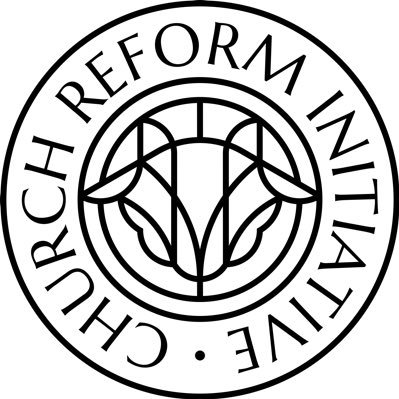A Plea to Southern Baptists to Demand Financial Transparency and Real Accountability from the SBC
Editor’s Note: Last fall, thousands of Christians watched the shocking two-part documentary The Real David Platt, produced by the Church Reform Initiative. The documentary tells a heartbreaking story of corruption, conspiracies, wokeness, and an abuse of power that marred Lon Solomon’s legacy at McLean Bible (MBC) and divided the church.
As a Southern Baptist, I was scandalized to learn that Convention elites had aided Platt and his cadre of insiders at MBC in a duplicitous effort to force a constitutionally non-denominational church into cooperation and affiliation with the SBC. Why? To raid their coffers for “church planting” in the D.C. area and ensure that Platt could remain at the upper echelons of SBC life, even as he stepped away from the IMB. As I’ve said before, the documents, depositions, and interviews reveal what amounts to a “money laundering scheme” being run behind the backs of the good Christians and members of MBC. And SBC insiders are right at the center of it.
The sad saga reminds me of Nathan’s rebuke to David after he committed adultery with Bathsheba and murdered her husband, Uriah (2 Samuel 12:1-13). The SBC has tens of thousands of cooperating and giving churches. Why did Platt and his enablers need to steal and slaughter this one non-denominational sheep?
As the SBC prepares to vote on financial transparency in Dallas at our 2025 Annual Meeting, I believe this story underscores just how crucial increased transparency and accountability are in the SBC right now. So, I asked the Church Reform Initiative to write a summary of the SBC-specific portions of the documentary, with relevant documentation attached.
What follows is the fruit of their labors, done in love out of a genuine desire for the purity of the church and the good of Southern Baptists.
Please read this in full and review the documentation (all of which has previously been made public and is already available on the CRI’s website). It proves that Platt and his enablers brought MBC into the SBC behind the congregations’ backs, sent millions of MBC tithe dollars to the SBC without a single congregational vote, and then lied about it to the church. Then, share this with other Southern Baptists, visit Pastor Rhett Burn’s financial transparency website, sbctransparency.net, and come to Dallas ready to take action.
William Wolfe, Executive Director, Center for Baptist Leadership

Located just thirty minutes outside of Washington, DC, McLean Bible Church found itself embroiled in a scandal ripe with secrecy and deception that would finally come to light nearly ten years later.
The Real David Platt: The Hijacking of Mclean Bible Church Parts 1 and 2, a two-part documentary produced by the Church Reform Initiative and released last year, exposed the corruption and deception under David Platt’s leadership. It revealed that a once-staunchly independent, non-denominational church in Vienna, Virginia, was led by Platt and SBC insiders to secretly affiliate with the largest Protestant denomination in the country.
Discovery documents obtained from a breach of contract lawsuit filed against the church in 2022 paint a damning picture of coordinated, deceptive tactics employed by key figures within the Southern Baptist Convention (SBC) and McLean Bible Church (MBC).
The intent was to blur the lines between partnership and denominational affiliation, concealing a gross violation of the church’s legal framework.
And the reason was to gain access to one of the most influential churches in Washington, D.C., and its substantial budget.
Written by current and former MBC members, this article uncovers the role key SBC players played in the deceptive bait-and-switch that shook MBC to its core.
History of Mclean Bible Church
For thirty-seven years, Lon Solomon faithfully led Mclean Bible Church, a strictly non-denominational church grounded in rich biblical teaching, discipleship, and ministry. Its one focused vision was to “Make an impact on secular Washington D.C. for Jesus Christ.”
The fruit was undeniable as MBC grew to one of the largest churches on the East Coast, with 16,500 weekly attendees. MBC’s influence not only impacted Washington but also the world. Senators, congressmen, White House officials, and foreign dignitaries were regularly in attendance, and their call to action was to live out their faith in public life.
As MBC peaked in growth and influence, the SBC found itself on the other end with a steady decline in membership, baptisms, and mission funding. In 2009, in response to growing concerns, the SBC created the “Great Commission Resurgence (GCR) Task Force,” which included a call to “unleash” the North American Mission Board (NAMB) in their church planting efforts.
Unbeknownst to MBC congregants, six years later, NAMB president Kevin Ezell would send this Trojan horse through MBC’s door under a ministry known as “New City Network.” Later emails would show that this affiliation and ministry partnership was the first step that paved the way for David Platt, then president of the IMB, to take over the church, bringing it into complete alignment with the SBC despite its constitution.
The Constitutional Betrayal
MBC’s constitution is unequivocal: “This church shall not, and cannot, be affiliated with any denomination, but shall remain independent for the promotion of the Gospel of our Lord Jesus Christ.”
This clause, enshrined as unamendable, has been the bedrock of MBC’s identity since its founding in 1961.
Yet evidence from discovery documents and depositions reveals that representatives from NAMB, the IMB, and the SBC Executive Committee forged deep ties with MBC insiders behind the scenes, funneling church tithes to SBC endeavors to advance SBC causes.
This resulted in a web of financial entanglements and cemented MBC’s affiliation as a Southern Baptist church. The documents expose a stark violation of MBC’s non-denominational mandate.
The initial affiliation came in March/April 2016 when the then-Elder Chairman, Larry Cooper, and MBC Trustees requested a national affiliation through the SBC Executive Committee (MBC_000632). On April 19, 2016, New City Network Inc., an integrated auxiliary of Mclean Bible Church in partnership with NAMB, was born.
Members of MBC had no idea that this was happening. From what we can tell, this was the first step in a premeditated journey to prepare the way for David Platt to take over the church and bring MBC into the SBC, despite its constitution.
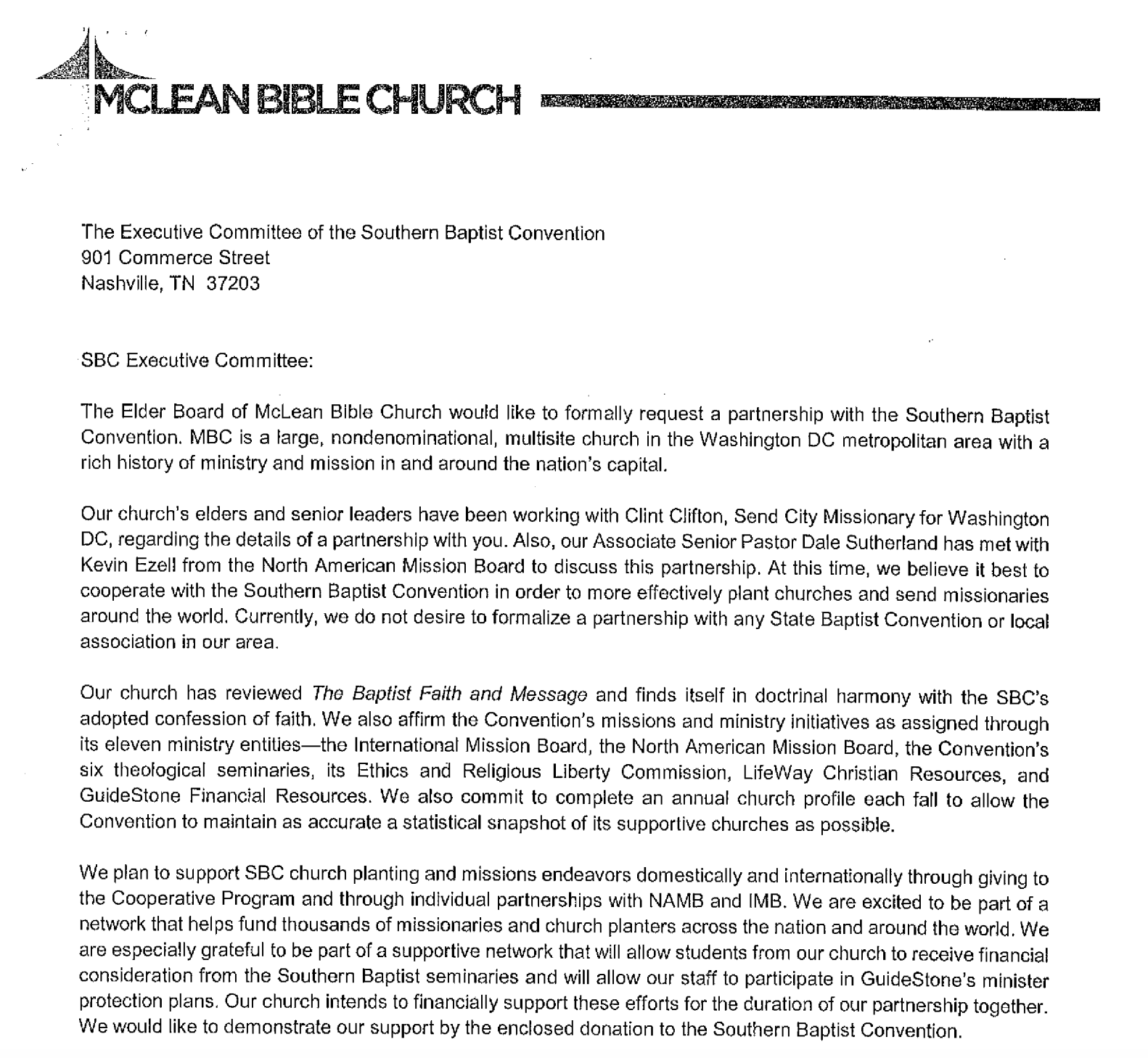
Despite the elders’ position of limiting the affiliation to the national convention, in August 2017, MBC’s Executive Pastor, Dale Sutherland, and MBC’s Director of Operations, Bill Steele, signed a formal partnership application with the SBC of Virginia (SBCV), a State Baptist Convention (MBC was “unable to produce” this document for some reason, but the SBCV ultimately provided it through a court subpoena).
Notably, this second affiliation coincided with David Platt assuming the role of interim teaching pastor (SBCV-01).
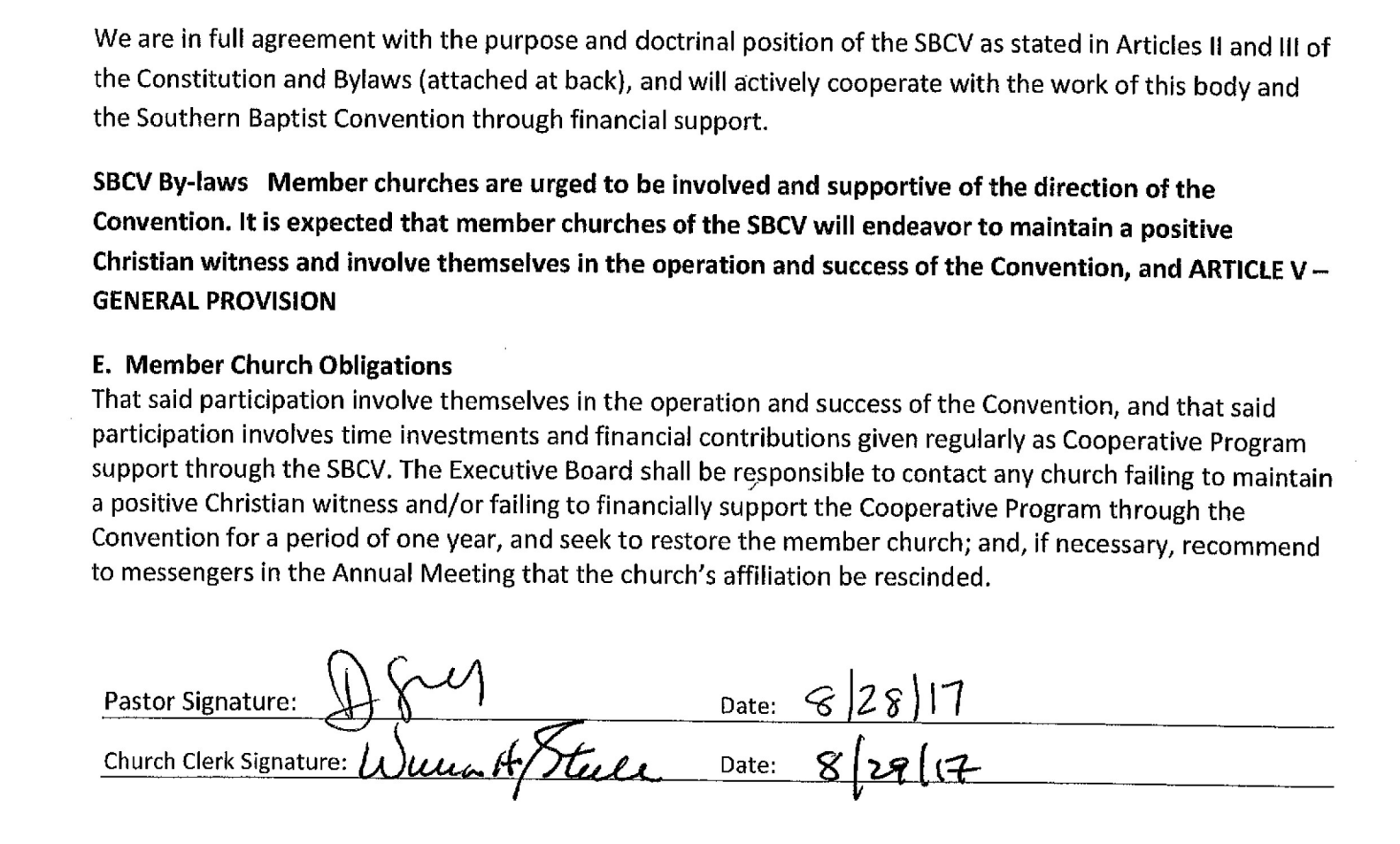
By March 2021, the SBC Executive Committee would confirm MBC’s affiliation at all three levels: national convention, state convention, and local association.
Various articles and public records refer to MBC as a “Southern Baptist” church, which directly contradicts MBC’s constitutional prohibition on denominational ties.
Financial Entanglements: The Money Trail
The financial ties between MBC and the SBC are staggering, further implicating the church in a denominational alliance.
From 2017 to 2021, MBC contributed over $2 million to SBC-related initiatives supporting local church planting, disaster relief, missionaries, theological training, and other projects (Burke et al v. Mclean Bible Church- Attorney’s Summary of Litigation Letter).
Additionally, MBC funneled at least $375,000 through the SBC’s Cooperative Program (Gifts to SBC/SBCV).
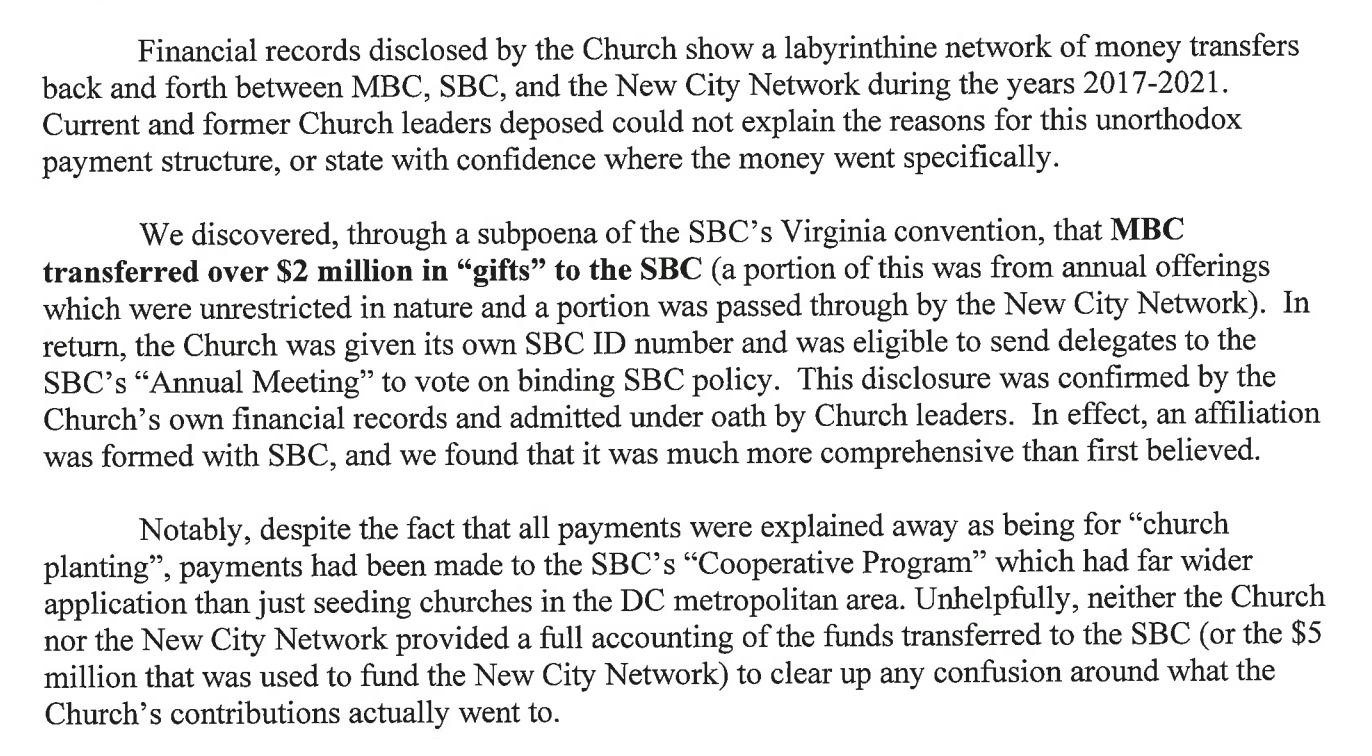
New City Network (NCN), established as an integrated auxiliary of MBC for church planting in partnership with NAMB in 2016, served as the linchpin of this controversy. Documents reveal that NCN, led by Clint Clifton, a NAMB employee, had planted over 50 SBC-affiliated churches, all required to affirm the Baptist Faith and Message 2000 (MBC_001683-001693). In March 2017, IMB spokeswoman Julie McGowan described MBC as the “hub for the North American Mission Board’s church–planting efforts in the D.C. area.”
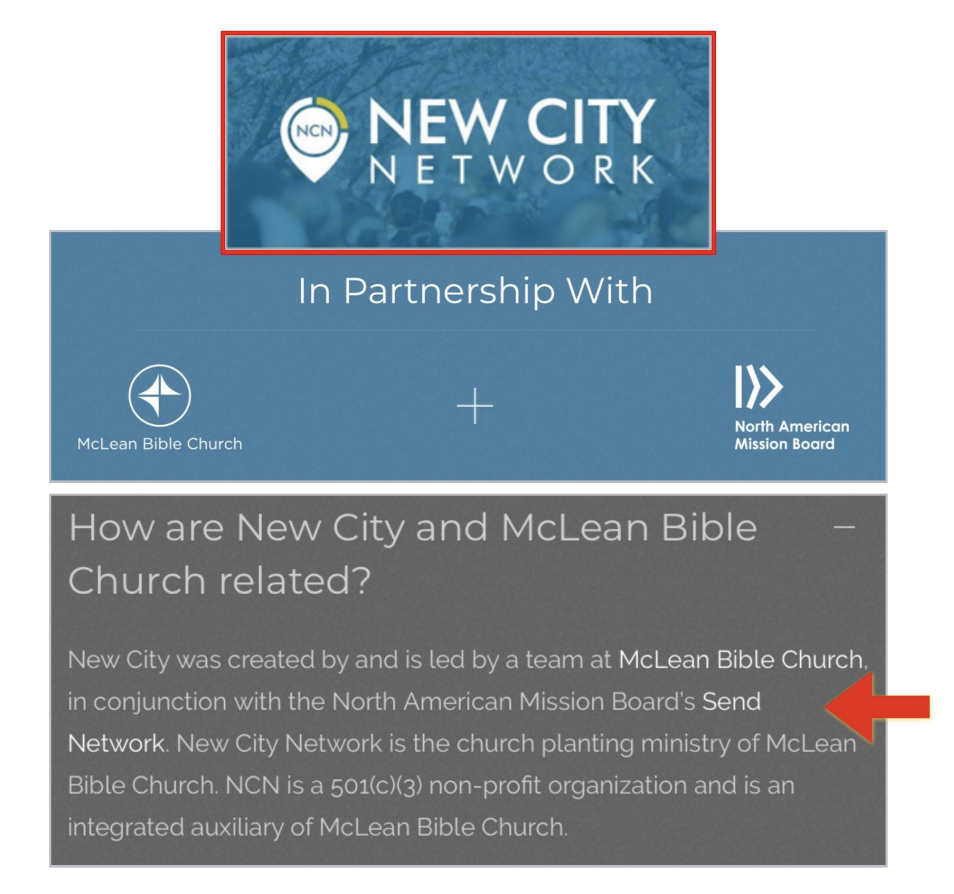
NCN’s financial summaries included significant revenue for specific church plants and payments from NAMB: MBC_001497-001498, MBC_00149-001500, MBC_001501-001502, MBC_001503-001504, MBC_001505-001506.
This financial and operational dependence on an SBC entity underscored MBC’s drift from its independent roots.
Discrepancies: Partnership or Affiliation?
MBC’s leadership, particularly David Platt, tried to maintain that its relationship with the SBC was merely a “partnership” for mutual ministry goals, not a formal denominational affiliation, and describes MBC as “decidedly independent,” emphasizing partnerships with NAMB, IMB, and SBC seminaries to plant over 50 churches, send missionaries, and educate members. They framed these ties as consistent with MBC’s mission to “glorify God by making disciples and multiplying churches”(MBC_001627).
However, the SBC’s records tell a different story.
In an email dated March 16, 2021, Ashley Clayton, Director of Church Affiliation for the SBC’s Executive Committee, confirmed to MBC member Jeremiah Burke that, according to their database, MBC was “affiliated with the SBC” at all three levels and that by strict definition, the SBC could be considered a denomination (MBC_001667).
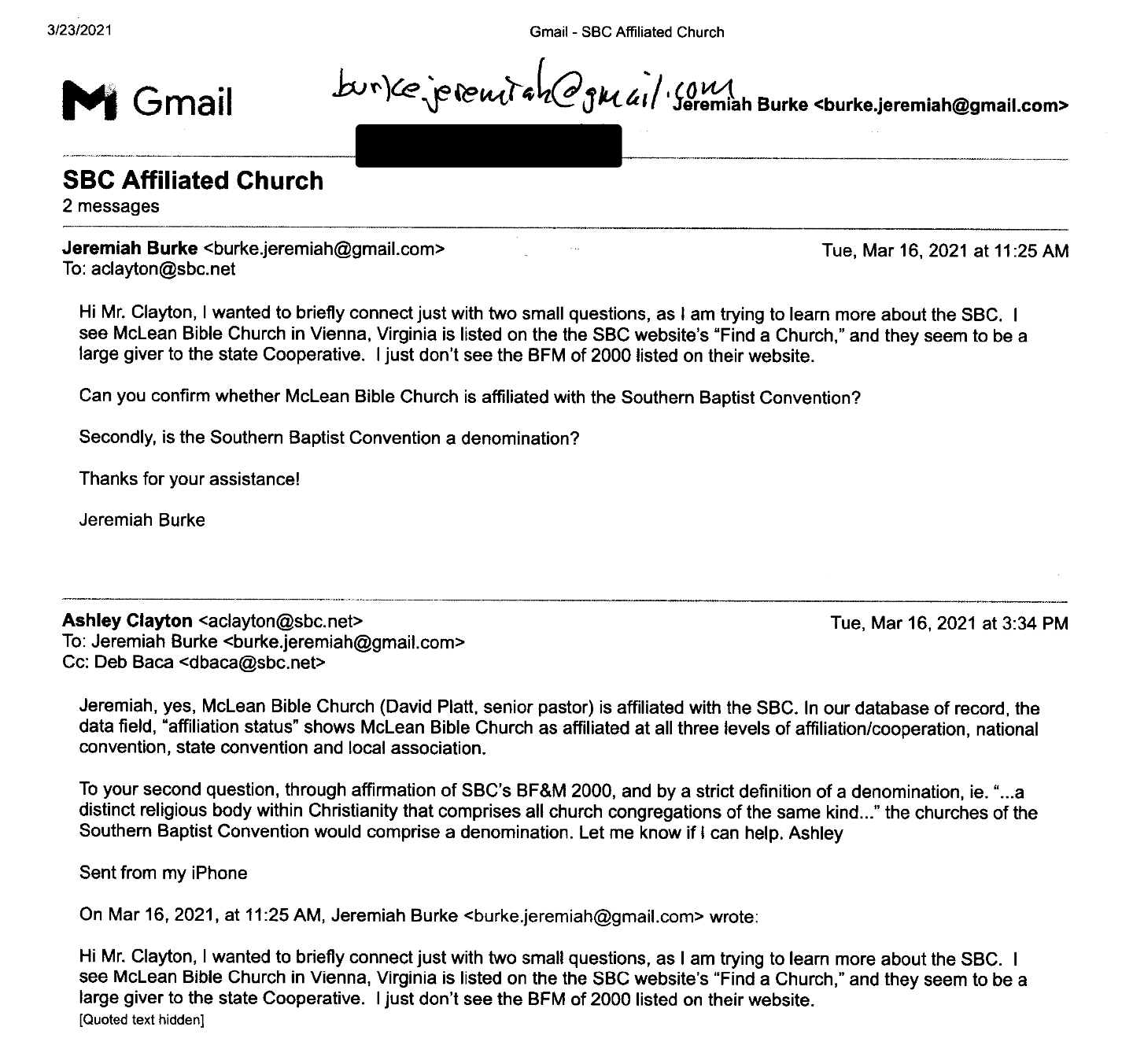
This affirmation, coupled with MBC’s listing on the SBC’s ChurchSearch tool and its Cooperative Program contributions, directly contradicted the church’s public stance.
The discrepancy is glaring. How can MBC claim “independence” while the SBC recognized it as a fully affiliated member?
In response to mounting congregational pressure, MBC leadership and the SBC attempted to “clarify” the relationship. A draft email from Platt to Clayton, forwarded to Larry Cooper, and Executive Pastor, Wade Burnet, requested a public statement that MBC is an “independent, non-denominational Bible church” and that any affiliation claim was a “miscommunication” (MBC_001741).
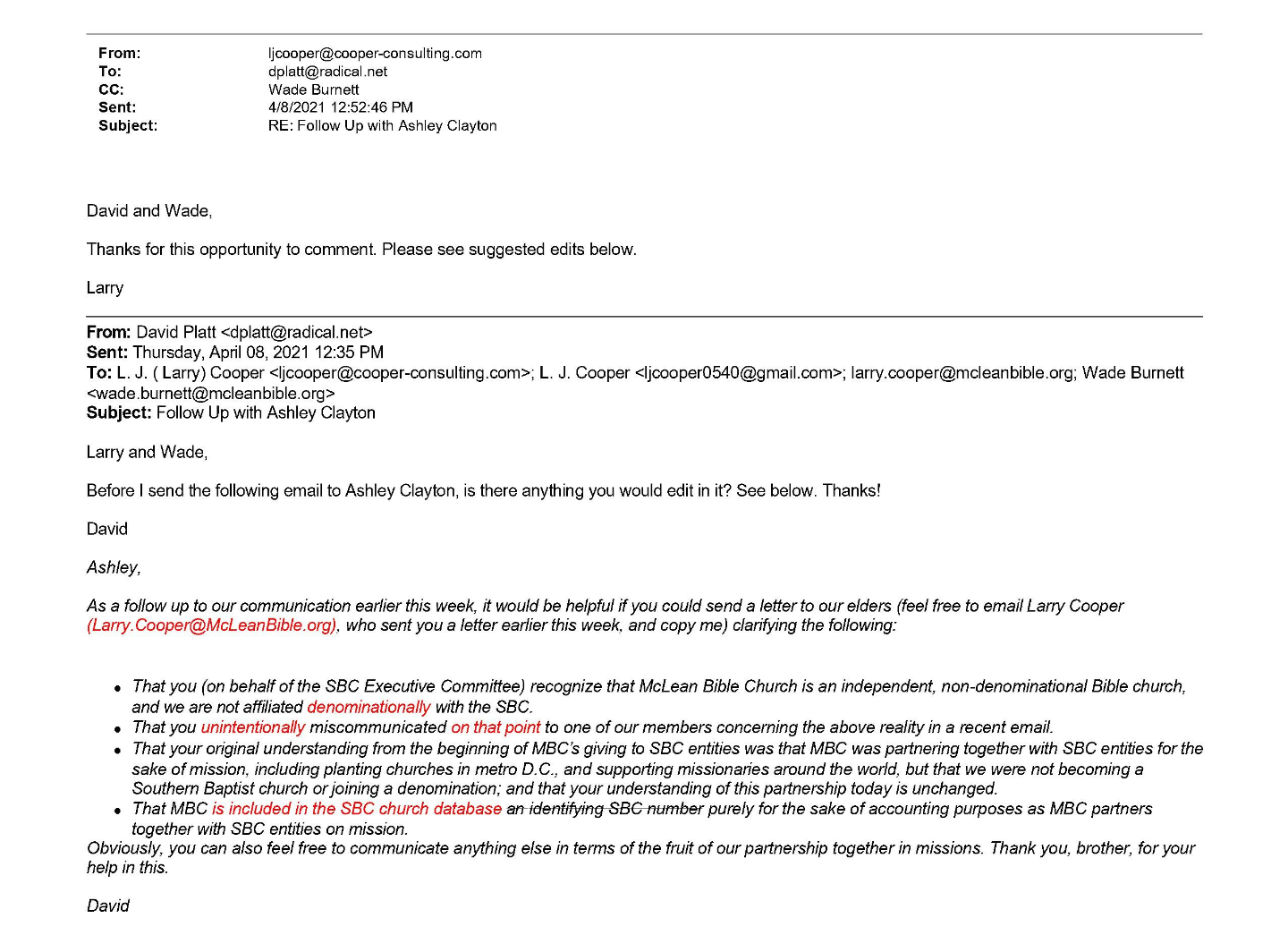
By July 12, 2021, the SBC updated its ChurchSearch tool to describe listed churches as being in “friendly cooperation” rather than formally affiliated.
Yet, this semantic shift does little to erase the evidence of MBC’s financial contributions, NCN’s SBC-aligned church plants, and the SBC’s own database records (MBC_001665).
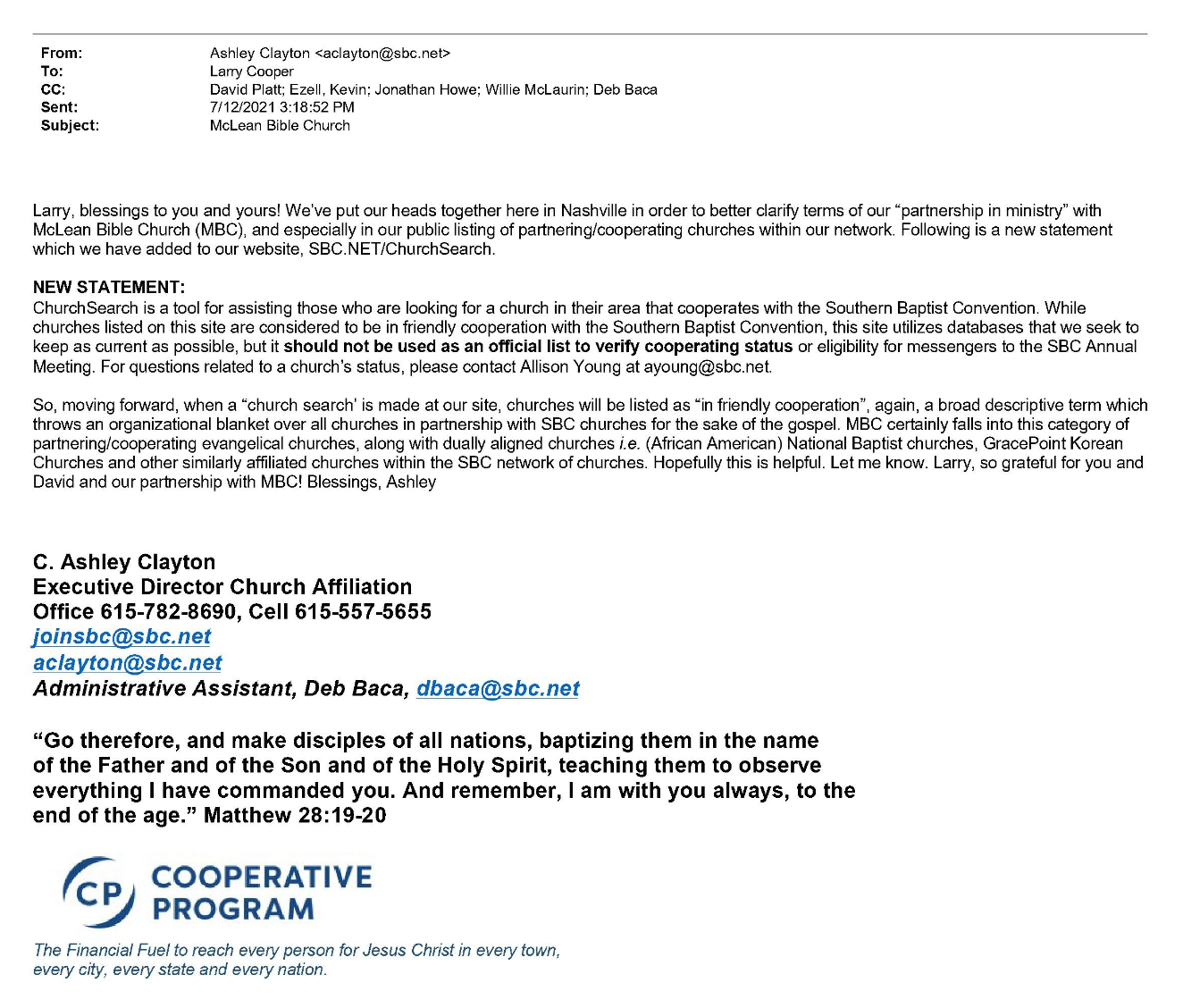
Deception and Congregational Unrest
The heart of the controversy lies in instances of deception by MBC’s leadership, particularly Platt.
During a March 31, 2021, congregational meeting, Platt was asked four times whether MBC was affiliated with the SBC.
His responses, described as “obscure and evasive,” distinguished between “affiliation” and “partnership” without providing a clear answer. This prompted a motion from members to dismiss Platt for “personal spiritual misconduct, specifically lying and deceit” and to end MBC’s SBC ties.
As of June 21, 2021, the elder board had not responded, fueling further distrust. Congregants like Jeremiah Burke took matters into their own hands, seeking clarity directly from the SBC. His inquiry exposed the SBC’s affirmation of MBC’s affiliation, contradicting Platt’s narrative.
The documents reveal a church leadership caught in a web of its own making.
MBC’s constitutional mandate for independence was at odds with its extensive financial and operational ties to the SBC, first facilitated through NCN and NAMB, painting a picture of a church that crossed the line from partnership to denominational alignment. Platt and the MBC elder board’s tactics to prevent transparency deepened the rift with congregants betrayed by a leadership that prioritized external alliances over internal accountability.
The attempted clarifications—Platt’s letter to Clayton and the SBC’s “friendly cooperation” rebranding—appear to be damage control rather than genuine transparency.
Meanwhile, NCN’s financial records expose the scale of MBC’s commitment to SBC-aligned church planting, with funds flowing from MBC to NAMB and the Cooperative Program.
This is not the story of a church merely partnering for the gospel; it is the story of a church that has embraced a denominational identity in defiance of its founding principles and for the purpose of lining the coffers of SBC “church planting” schemes
The Southern Baptist Power Players Behind McLean Bible Church’s Controversial Ties
Leaked emails from January 2017 to August 2021, combined with recent revelations, point to a cadre of SBC insiders who played pivotal roles in aligning MBC with the SBC, against its non-denominational constitution. Who were these key figures, and what did they do to steer MBC into this storm?
Let’s uncover the leading SBC players and their roles in the controversial takeover that shook a church and its community.
David Platt: The Charismatic “Providential” Catalyst
David Platt emerges as the central figure in this saga. From 2014 to 2018, Platt was president of the IMB, an SBC entity. In February 2017, Platt took on the role of Interim Teaching Pastor at MBC, a move approved by IMB trustees as a “wise use of his time” to lead a local church while heading the missions agency.
On August 17, 2017, Paul Akin, then a senior aide to the President of IMB, sent an email to Dale Sutherland (MBC Executive Pastor) that was prompted by a meeting with David Platt and IMB’s PR team (MBC_001527-001528).
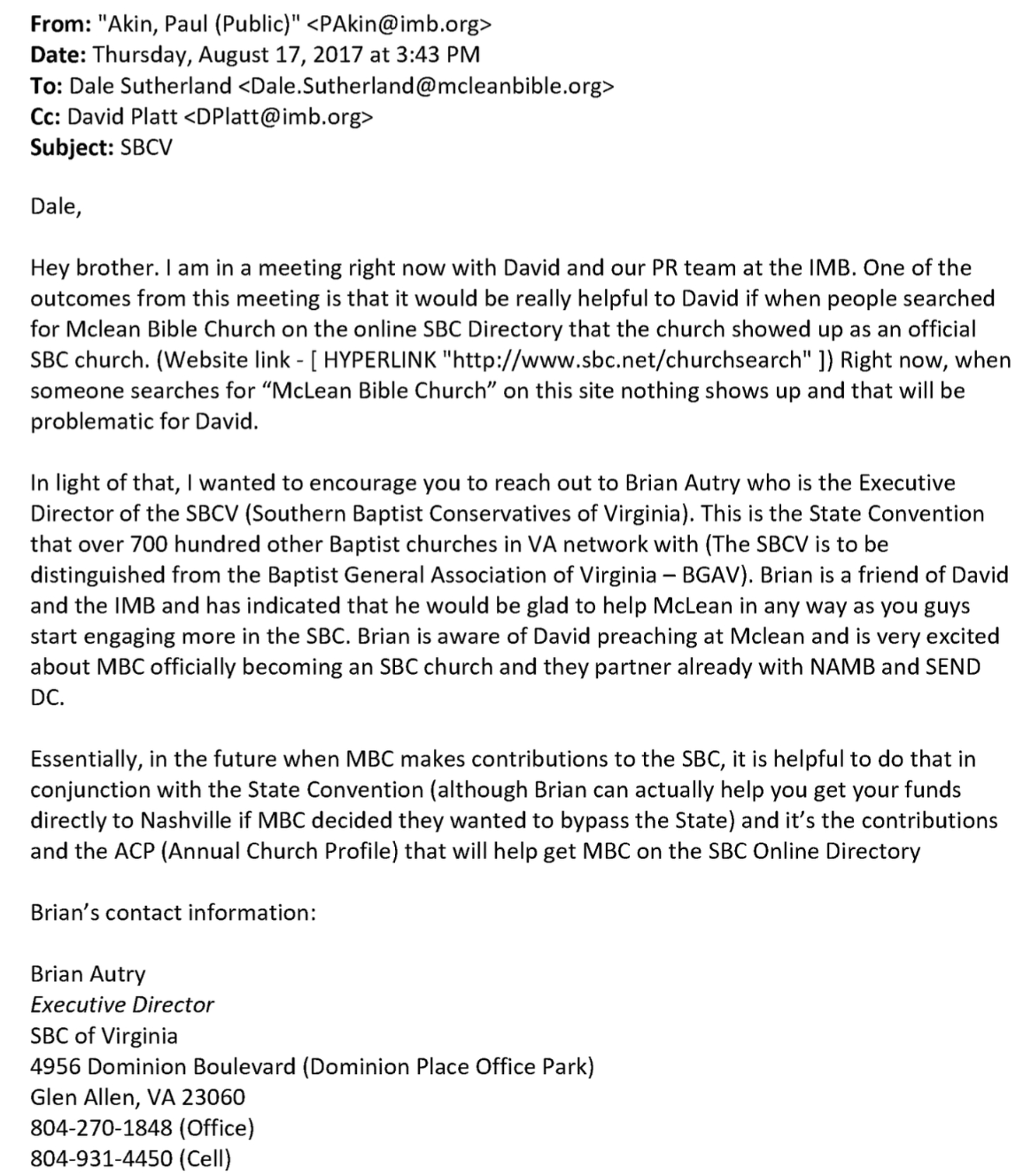
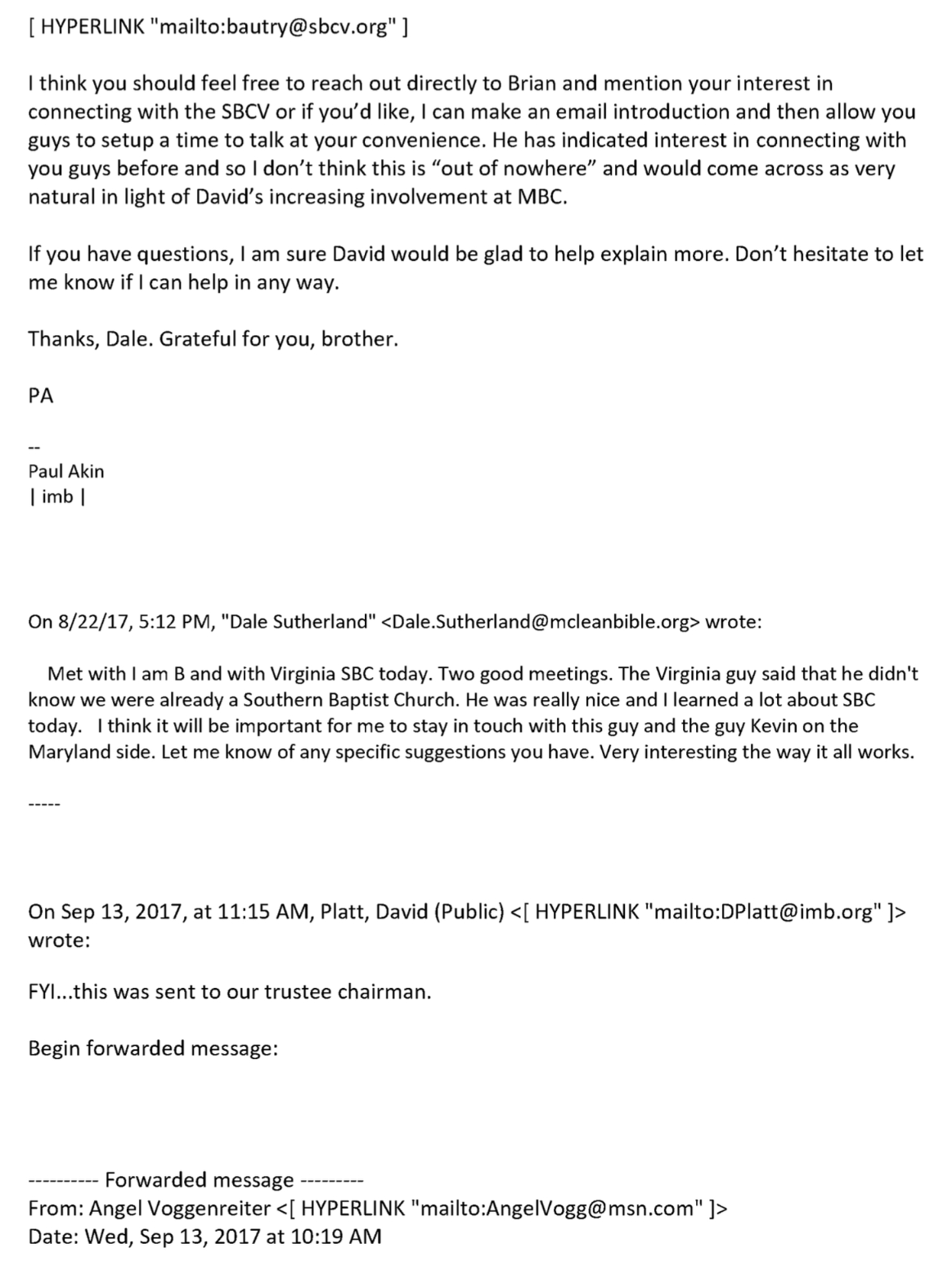
By listing MBC as an official SBC church in the online church directory, Platt’s leadership at both MBC and IMB appeared consistent with SBC polity and ensured that the commitment was visible to stakeholders, reducing perceptions of conflict or divided loyalty.
Affiliating with the SBCV and contributing through the state convention established MBC as a cooperating church, aligning with SBC criteria (financial giving, doctrinal agreement, and Annual Church Profile submission).
This was critical to the top-down effort by SBC entities driving MBC, an independent church, into full alignment and integration with the SBC.
By September 2017, Platt was named Pastor-Teacher at MBC. He eventually resigned from the IMB in 2018 to focus on the church full-time.
Emails reveal Platt as a bridge between MBC and SBC, leveraging his influence and access to resources to ensure MBC was fully aligned with the SBC to deepen its ties and use MBC’s substantial financial resources for SBC purposes, disregarding the church’s constitution.
A bombshell discovery in a 2022 Virginia lawsuit finally exposed Platt’s deception.
Despite publicly denying that Mclean Bible Church was a member of the SBC on July 4, 2021, documents revealed that MBC, a “member church” affiliated with the Southern Baptist Convention of Virginia, elected David and his wife Heather as messengers to the SBC’s Annual Meeting in violation of MBC’s constitution (MBC_001468-001469; MBC_001470-001471).
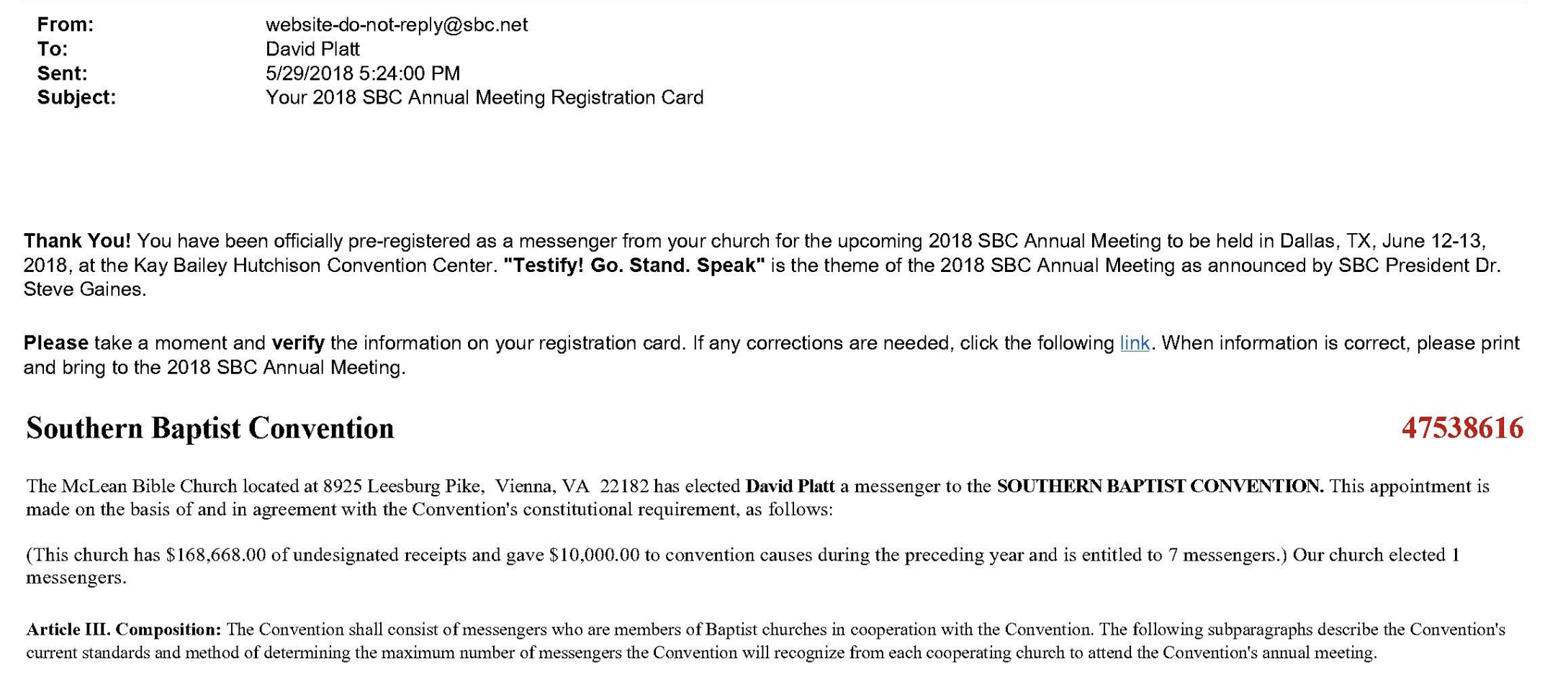
This discovery and his influence in directing hundreds of thousands of dollars to the SBC while serving concurrently as Interim Pastor of MBC and President of IMB reveal a “hostile takeover” of a constitutionally independent church.
While Platt’s dual role positioned him as a linchpin in this controversy, he didn’t act alone. Many other major players in the SBC were intimately involved.
Kevin Ezell: The Church-Planting Strategist
Kevin Ezell, NAMB’s President, played a critical role in forging MBC’s SBC partnership and affiliation, even meeting with (then) Executive Pastor, Dale Sutherland. NAMB, focused on church planting and evangelism, partnered with MBC to make it a hub for the “Send D.C.” initiative, aiming to plant Southern Baptist churches in the region through MBC’s integrated auxiliary, New City Network.
Emails from February 2021 detail NAMB’s financial support and strategic alignment for MBC’s church planting ministry. This strengthened SBC efforts in a strategic region and supported the GCR Task Force’s emphasis on mission efficiency under Ezell’s leadership.
A 2022 lawsuit alleged NAMB’s funding and church-planting efforts violated MBC’s non-denominational status, with Ezell’s NAMB investing $640,000 to NCN church planting projects, and it was this partnership that paved the way for Ezell’s friend and colleague, David Platt (MBC_000790).
Ezell’s strategic vision for “expanding the SBC’s reach” placed MBC in the crosshairs of members who felt betrayed by the denominational bait and switch.
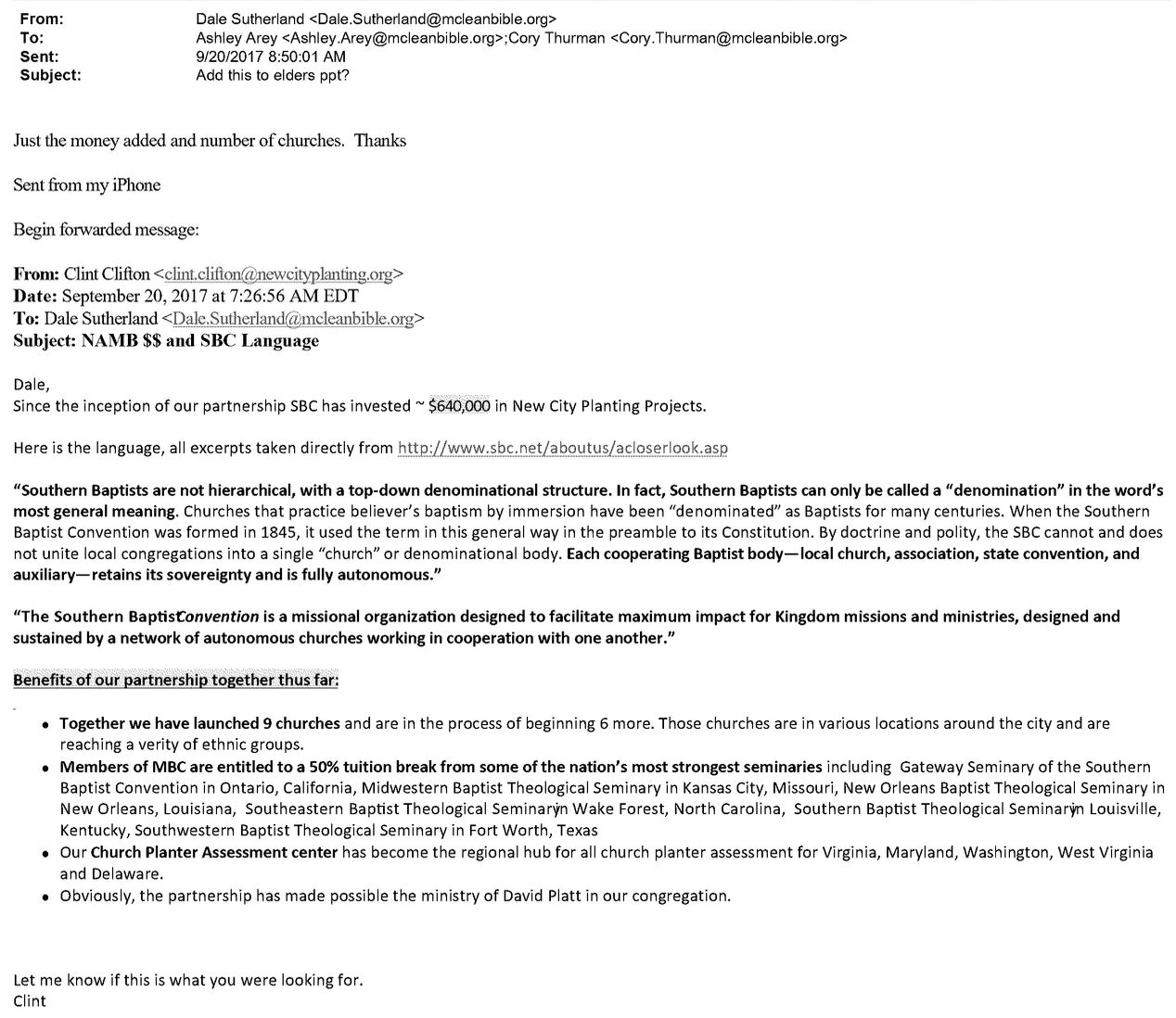
Clint Clifton: The Ground-Level Operative
Clint Clifton, a city missionary for Baltimore and D.C., employed by NAMB under Kevin Ezell, was the boots-on-the-ground architect of MBC’s SBC ties.
MBC member Jeremiah Burke identified Clifton as “seemingly the genesis of this SBC relationship.” Launched in 2016, Clifton coordinated church-planting efforts through NCN.
Emails from 2016-2021 highlight Clifton’s role in aligning MBC’s outreach with NAMB’s Send D.C. strategy, training SBC-affiliated church planters and managing the day-to-day business operations, including millions in church funds designated for church planting (MBC_002179).
His work predated Platt’s arrival, suggesting a deliberate SBC strategy to integrate MBC under Lon Solomon’s leadership. Former MBC elders admitted they were unaware that MBC was planting SBC churches, signaling very minimal oversight over Clint Clifton and NCN.
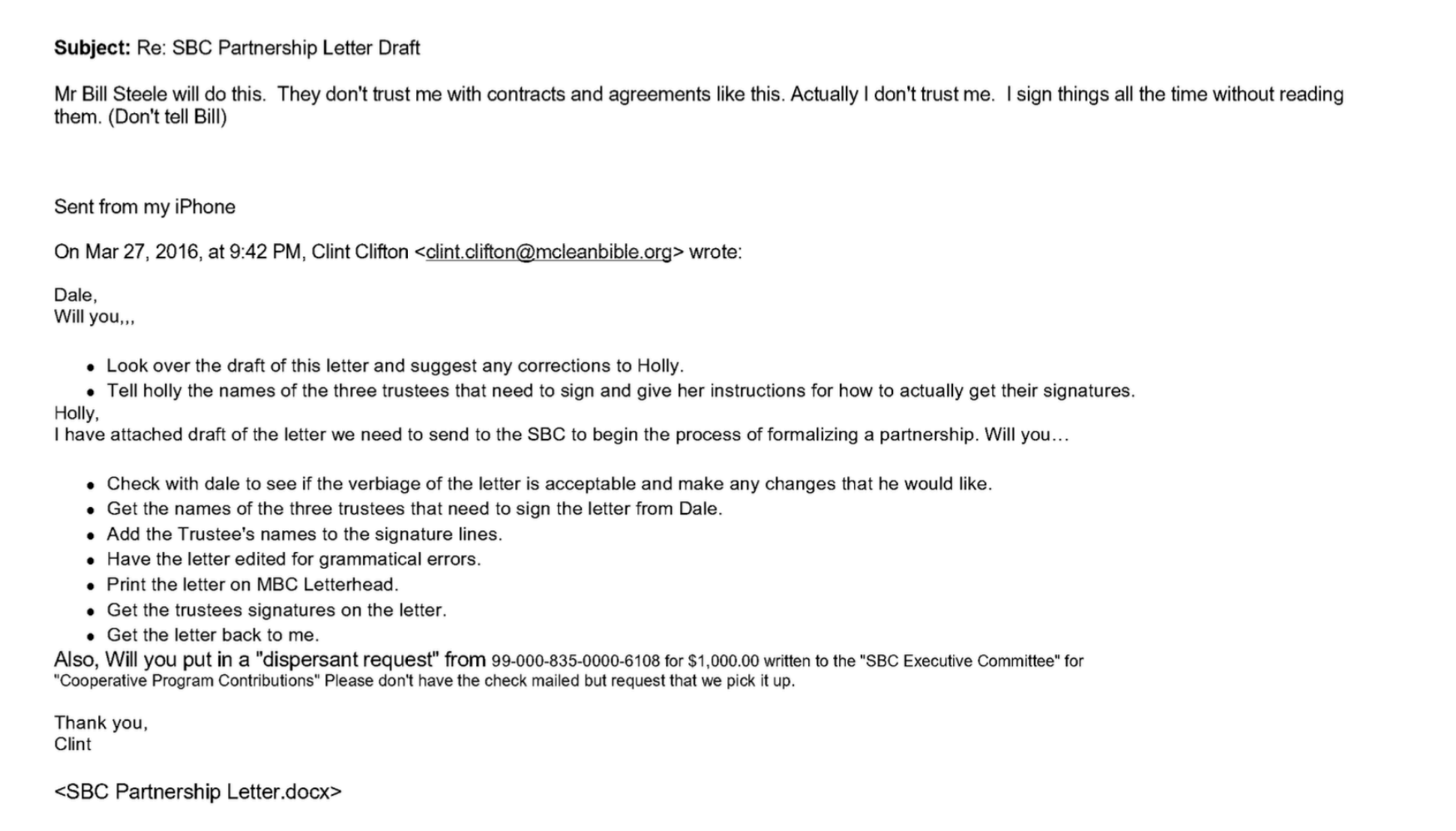
And as this email makes clear, “NCN exists directly alongside Send D.C. (a NAMB initiative)” (MBC_001820).
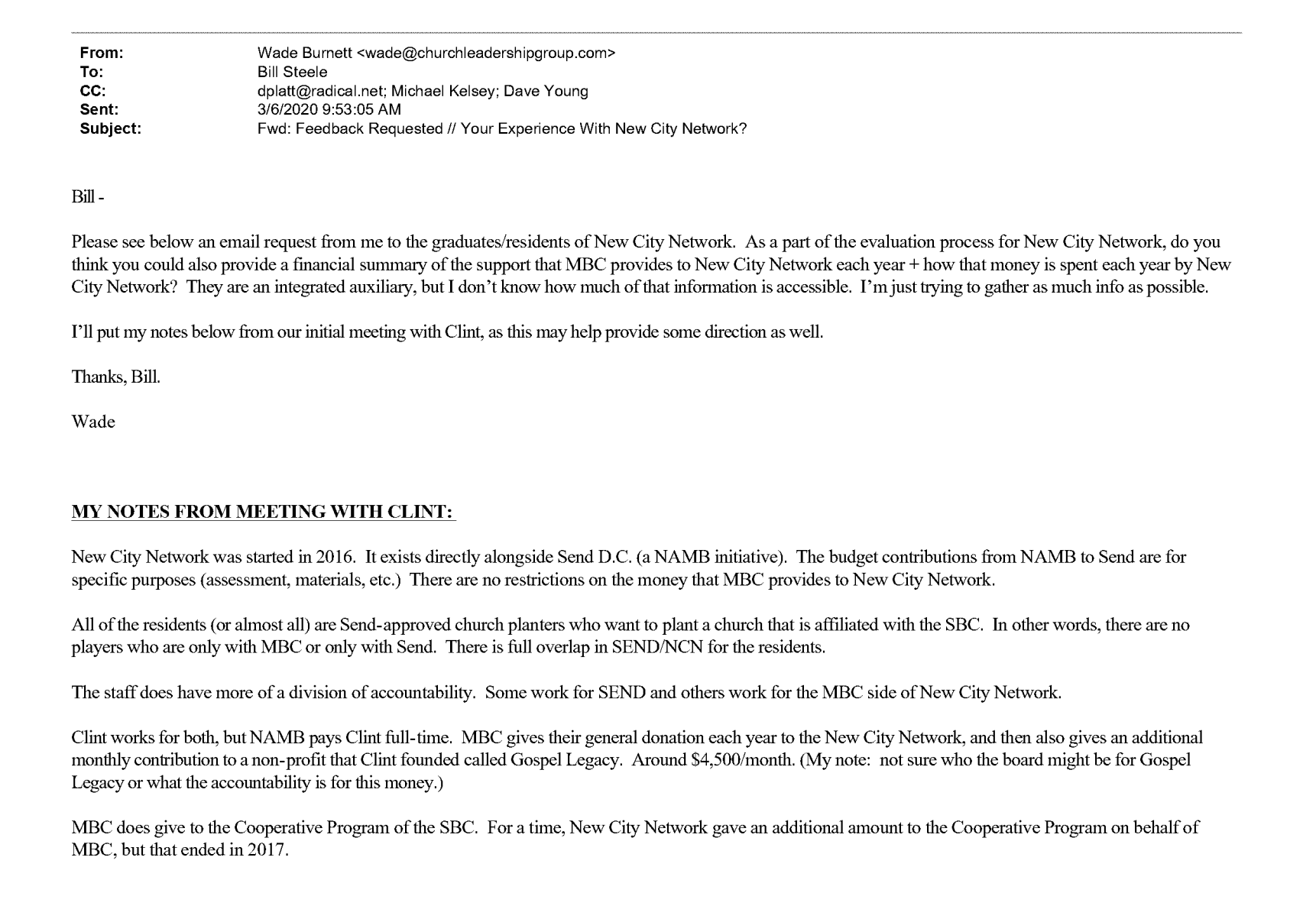
Clifton’s influence was crucial in operationalizing the partnership. Clifton’s role underscores how SBC operatives embedded within MBC’s initiatives laid the groundwork for denominational ties, often without transparent communication to the congregation (MBC_001546).
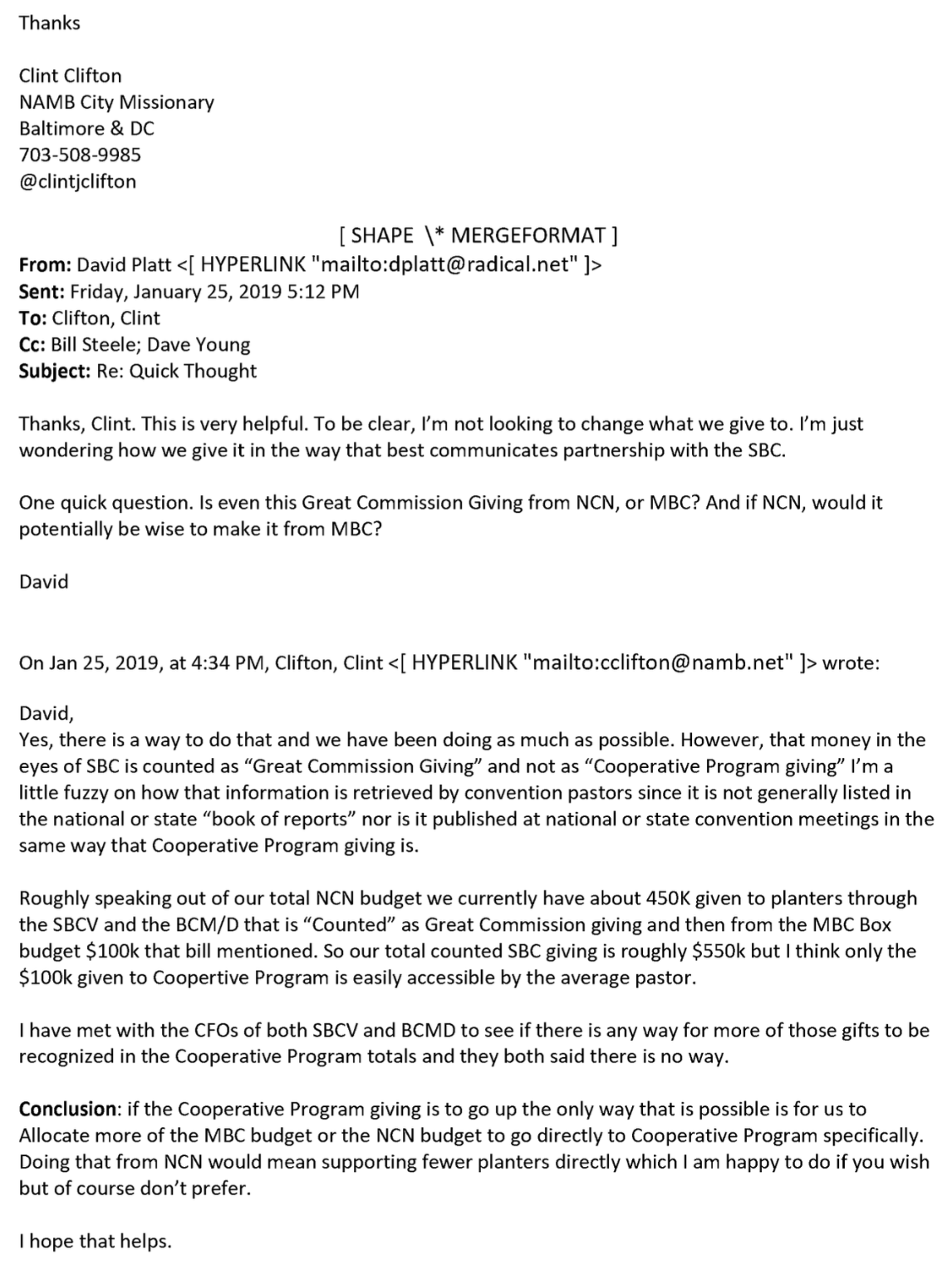
Hance Dilbeck: The Trustee Enforcer
Hance Dilbeck, then an IMB trustee, was a key gatekeeper in approving Platt’s dual role. In a July 1, 2017, email, Dilbeck relays concerns that he received overnight regarding a public post on a Wikipedia page announcing that on June 28, 2017, MBC formally offered Platt the role as the church’s new Senior Pastor, replacing Lon Solomon (MBC_001519-001520).
An announcement that was seen as premature, Dilbeck noted that it had put undue pressure on the IMB board and asked that MBC avoid this until they can get on “the same page.”
MBC’s very public and strict stance as an independent church added to the complexity that the board needed to consider. As chair of the trustee meeting in September 2017, Dilbeck announced the board’s decision to evaluate Platt’s ability to juggle IMB and MBC responsibilities, a move that temporarily sustained the arrangement; however, later emails would give the appearance that some of this time was used to ensure that MBC fully aligned and integrated with the SBC.
Dilbeck’s caution reflected the SBC’s sensitivity to external perception, particularly as Platt’s MBC role raised questions about IMB leadership. His oversight ensured Platt’s transition was framed as a strategic win for the SBC. Still, it also delayed scrutiny of MBC’s deepening ties, contributing to the eventual backlash from members who felt misled.

Ashley Clayton: The Misstepping Bureaucrat
In his email dated March 16, 2021, to Jeremiah Burke, Ashley Clayton (Director of Affiliations for the SBC Executive Committee) responds authoritatively, confirming MBC’s affiliation with the SBC at national, state, and local levels and defining the SBC as a denomination.
This is further complicated by Platt’s evasive responses during the March 31, 2021, congregational meeting, which contradict Clayton’s clear definition.
Clayton’s involvement escalates when he sends an email to Larry Cooper on April 20, 2021, clarifying his “mistake” and reflecting the same points Platt had requested in his draft email of April 8th.

Later, in July, Clayton changed the SBC’s ChurchSearch tool, adding a new statement emphasizing accurate database maintenance for churches in “friendly cooperation” with the SBC.

MBC’s affiliation request violated its constitution, which mandates independence and prohibits denominational ties. Clayton’s initial email in March 2021 confirmed the violation, while Platt’s later request to Clayton sought to align MBC with its constitutional stance, maintaining a facade.
Clayton was pivotal in the deception, bridging the SBC’s official stance and MBC’s evolving narrative. The conflicting claims reflect a tug-of-war between MBC’s constitutional independence and its documented SBC ties (Ashley Clayton Struggles Under Oath).
The Fallout: A Church Divided, A Partnership Dissolved
The actions of these SBC players drove MBC leadership into a crisis, and by 2021, MBC elders voted to end the SBC “partnership” amid “confusion and concern.”
However, like Platt, they maintained that they were never affiliated with the SBC despite the evidence presented.
As of December 2021, NCN was no longer an integrated auxiliary, leaving the “NAMB church planting hub of D.C.” to fend for itself as an independent 501(c)(3). Since then, the church planting organization has been rebranded twice. Today, it is known as the Nicene Network, crediting the work started by Clint Clifton, who tragically passed away in 2023.
By March 2022, MBC was no longer listed in the SBC church directory, and the church’s website omits references to the SBC.
However, the fallout of the cover-up continued, especially for some dissident members whose voting rights were removed by the church. Others faced threats of church discipline and trespassing, even going as far as prosecution for two members (The Real David Platt Documentary 1 and 2).
According to Burke, Platt also spent $750,000 of church funds during litigation to block document disclosure.
The Bigger Picture: Power and Deception
The discovery documents reveal a calculated effort by SBC and MBC insiders to integrate a prominent non-denominational church into their fold for financial gain.
Platt, with the help of Kevin Ezell, Clint Clifton, Hance Dilbeck, Ashley Clayton, and MBC insiders like former Executive Pastor Dale Sutherland and former Elder Chairman Larry Cooper, among others, executed a takeover that, under church governance, should have never happened.
The MBC saga portrays a small group of MBC insiders who prioritized the SBC’s agenda over local church autonomy and SBC elites who seemingly benefited from it. Just like us, the non-denominational pew-sitters, Southern Baptists need to know what has been done in their name by men they’ve entrusted to act in good faith for God’s glory and for the sanctity and purity of the Bride of Christ.
Apathy is no longer an option for God to truly be glorified through the Convention. Transparency and accountability must be demanded; anything less cannot be accepted because reform is impossible without it. This fight cannot be limited to organizations or pastors; like us, the pew-sitters in the SBC must also fight it.
The MBC story is not just a cautionary tale but a plea for every Southern Baptist to fight for what God has entrusted them.
We hope you will do that in Dallas.
But in case I am delayed, I write so that you will know how one should act in the household of God, which is the church of the living God, the pillar and support of the truth. 1 Timothy 3:15
Behold, I send you out as sheep in the midst of wolves; so be shrewd as serpents and innocent as doves. Matthew 10:16
Share This Story
